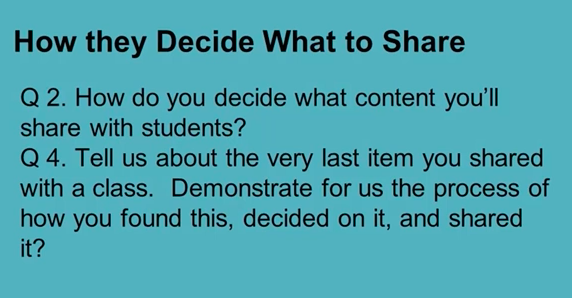Early January, OCLC held a webinar about a study done by by Temple University Libraries (Philadelphia, US) on practises of instructors selecting, sharing and organising course content. I didn’t have time then, but when we started to discuss what we as a library can do for teachers in the context of Open Education, especially for “Enrich online learning”, I decided to watch part of the webinar and look in to the study to see what we might learn from our colleagues across the ocean.
You can find a presentation as well as the webinar online at OCLC. The study has been conducted by doing a structured interview with ten full time teaching staff at Temple University. It has had a long run: from preparation in 2011 to presenting the results in 2015. The content in the study can be readings, video, images and other supporting materials other than the course syllabus.
So what are instructors doing and why? Some are creating home video’s and posting them on YouTube or streamed to Blackboard using Ensemblevideo.com. Pdf’s of published articles are shared using Google Sites. Textbooks are carefully selected to be used for the long term, but supporting materials like links, images are on-the-fly selections. Teachers have accumulated this material, sometimes organised using tools like Dropbox, Delicious or EndNote. How do they discover these resources? “Well, that’s my job to know. I’m always aware of things, so if it appears to me, I’m gonna see it.” Also, teachers rely on their network: “…A social network is a little bit less cumbersome than doing a keyword search in [database name].”

The take away for libraries is that the teachers said they rarely specifically search or “hunt” for course materials. What works at Temple is to weekly push content as an alert, such as an email with new book lists and/or relevant news from popular newspapers. What is necessary to be relevant is a good understanding of the appropriate level for the different target groups and a focus on quality.
According to Temple, to help teachers it might be more effective to “unbundle content” so instead of sending a link to an article or book, send a paragraph of chapter that is highly relevant. If I had been in the webinar, I would have asked: For all these (hundreds of) courses, how can the library have and maintain the knowledge to evaluate what is relevant and the right level for a specific course? They have library liaisons at the faculties at Temple, but I wonder if that is enough. Hey, let’s just send them an email!
